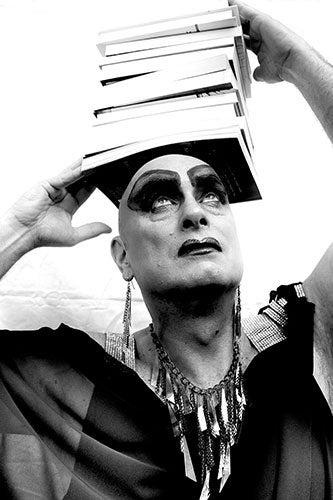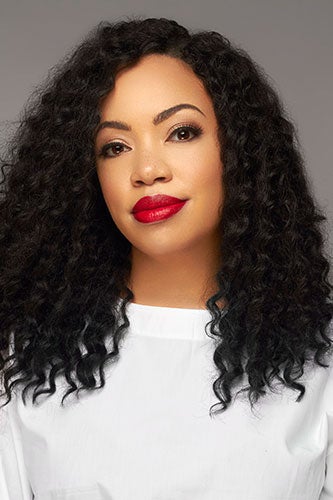Book banning, particularly children’s books, is one of the most widespread forms of censorship, claiming that readers will be swayed by the book’s content, or the material was considered to be sexually explicit, contain offensive language, or unsuitable for a particular age group.
To celebrate and encourage the freedom to read, the Feinstein College held a week-long series of events during Banned Books Week, Sept. 19-23, to bring awareness to censored and challenged books.
A conversation on Sept. 19 with Tiffany D. Jackson, filmmaker and New York Times bestselling author of young adult fiction, including Monday’s Not Coming, a 2021 banned book about a missing child that examines issues of abuse, gentrification, and the marginalization of people of color, discussed the importance of writing about such controversial topics.
“Banned Books Week celebrates our right to read. Censorship has devastating consequences. Reading allows us a glimpse into others’ worlds. We experience perspectives vicariously through submerging ourselves in topics with which we have little experience,” said Theresa Deeney, professor of reading, language, and learning disabilities in URI’s School of Education, and an event organizer.
She added, “Who should dictate those topics? Ask yourself, ‘who is the arbiter?’ When a small group becomes the arbiter for the rest, we lose our freedom to make decisions for ourselves. I’m thrilled that URI is standing up for our right to read.”
A two-day Drag Story Hour performance at the Providence campus library on Sept. 22 and 23, included URI alumni and faculty who perform with OutLoud Theatre, and the Trailer Park Girls performance ensemble, who read from currently banned children’s books.
The drag performers included Siobhan LaPorte-Cauley, Ottavia De Luca, Marc Tiberiis, and Patricia Tulli-Hawkridge from OutLoud Theatre, and the Trailer Park Girls ensemble.
An open forum of teachers, school librarians and information specialists who discussed censorship and navigating the challenges of contested books and topics was also part of the event.
“When our freedom of speech is gagged, our rights are being eviscerated,” said Steven Pennell, coordinator of the Arts and Culture program at URI, and one of the organizers of the event.
“As an educator and a performance artist, I believe that the idea of any important issue is remote unless we make an experiential connection,” said Pennell. “Censorship, having your voice and your needs dismissed. is very real and very dangerous. Exploring the reality through the words of a banned author, through the experience of classroom teachers, from the vantage point of drag performers and members of the LGBTQIA+ community and seeing the evidence in poster form is so much more impactful.”
Every year, the Office for Intellectual Freedom of the American Library Association, compiles a list of the Top Ten Most Challenged Books to inform the public about censorship. The lists are based on information from media stories and voluntary challenge reports from communities across the United States.
Banned Books Week is an annual event that celebrates the freedom to read and spotlights current and historical attempts to censor books in libraries and schools. Typically held during the last week of September, Banned Books Week highlights the value of free and open access to information.
Bringing together the entire book community — librarians, booksellers, publishers, journalists, teachers, and readers of all types — in shared support of the freedom to seek and to express ideas, even those some consider unorthodox or unpopular, Banned Books Week focuses on efforts across the country to remove or restrict access to books, and draws national attention to the harms of censorship.
Launched in 1982, Banned Books Week was a response to a sudden surge in the number of challenged books in schools, bookstores, and libraries.
The Top 10 challenged books for this year are:
- Gender Queer by Maia Kobabe
Reasons: Banned, challenged, and restricted for LGBTQIA+ content and because it was considered to have sexually explicit images. - Lawn Boy by Jonathan Evison
Reasons: Banned and challenged for LGBTQIA+ content and because it was considered to be sexually explicit. - All Boys Aren’t Blue by George M. Johnson
Reasons: Banned and challenged for LGBTQIA+ content and profanity and because it was considered to be sexually explicit. - Out of Darkness by Ashley Hope Perez
Reasons: Banned, challenged, and restricted for depictions of abuse and because it was considered to be sexually explicit. - The Hate U Give by Angie Thomas
Reasons: Banned and challenged for profanity and violence and because it was thought to promote an anti-police message and indoctrination of a social agenda - The Absolutely True Diary of a Part-Time Indian by Sherman Alexie
Reasons: Banned and challenged for profanity, sexual references, and use of a derogatory term. - Me and Earl and the Dying Girl by Jesse Andrews
Reasons: Banned and challenged because it was considered sexually explicit and degrading to women. - The Bluest Eye by Toni Morrison
Reasons: Banned and challenged because it depicts child sexual abuse and was considered sexually explicit. - This Book is Gay by Juno Dawson
Reasons: Banned, challenged, relocated, and restricted for providing sex education and LGBTQIA+ content. - Beyond Magenta by Susan Kuklin
Reasons: Banned and challenged for LGBTQIA+ content and because it was considered to be sexually explicit.

Papa Marc
‘Papa Marc’ presented the 2021 Banned Books in the URI Drag Queens and Kings Book Reading at the Providence Campus Library.
Tiffany D. Jackson
Keynote speaker Tiffany D. Jackson, author of
2021 banned book, Monday’s Not Coming.

